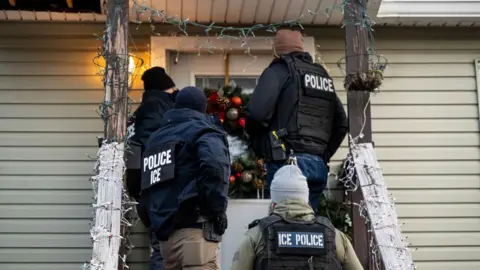Trump administration sues Chicago over 'sanctuary city' laws
 Getty Images
Getty ImagesThe US justice department has filed a lawsuit against Chicago, accusing local officials of impeding federal immigration enforcement efforts amid Donald Trump's drive to ramp up deportations.
The lawsuit - which mentions Illinois Governor JB Pritzker and Chicago Mayor Brandon Johnson - also seeks to block local laws it claims "interfere with and discriminate against" federal immigration policy.
Chicago's home state of Illinois is one of several that have vowed to push back against efforts to arrest and deport undocumented migrants, posing a challenge to the Trump administration's policies.
This week, new Attorney General Pam Bondi also vowed to slash federal funding to so-called "sanctuary cities".
The term "sanctuary city" has been popular in the US for more than a decade to describe places that limit their assistance to federal immigration authorities.
Since it is not a legal term, cities have taken a variety of approaches to becoming "sanctuaries", such as setting policies in laws or simply changing local policing practices.
In the case of Illinois, the state's "Trust Act" prevents local law enforcement from holding a suspect solely because of an immigration detainer or warrant, and prevents local agencies from helping with immigration operations or sharing information about detainees.
A similar ordinance in Chicago forbids city agencies and employees from helping, and prevents Immigrations and Customs Enforcement (ICE) agents from accessing detainees or using city facilities for investigations.
The lawsuit seeks to block these and similar laws, arguing that "impede the Federal Government's ability to regulate immigration and take enforcement actions against illegal aliens".
Speaking to reporters at the White House on Thursday, the Trump administration's border Czar, Tom Homan, said that "sanctuary cities are sanctuaries for criminals".
"We're going to hold them accountable and take them to court," he said, adding that he doesn't believe that Illinois authorities need to hold any suspects "a minute extra".
"Just let us in there," he said.
In a statement sent to the BBC, Pritzker said "unlike Donald Trump, Illinois follows the law", adding that the Trust Act - which was signed into law by Republican Governor Bruce Rauner - "has always been compliant with federal law and still is today".
"Illinois will defend our laws that prioritise police resources for fighting crime while enabling state law enforcement to assist with arresting violent criminals," the statement said. "Instead of working with us to support law enforcement, the Trump Administration is making it more difficult to protect the public, just like they did when Trump pardoned the convicted January 6 violent criminals. We look forward to seeing them in court."
In an interview with NPR in January, Chicago Mayor Brandon Johnson said that the city was "firm" in its policies.
"Whether you're undocumented, whether you are seeking asylum or whether you're seeking a good paying job, we're going to fight and stand up for the working people."
In a memo sent to employees on Wednesday shortly after being sworn into office, Attorney General Pam Bondi said that the justice department would end funding to any jurisdiction that interferes with federal law enforcement efforts.
"State and local jurisdictions must comply with applicable immigration-related federal laws," one memo says, adding that "state and local actors may not impede, obstruct, or otherwise fail to comply with lawful immigration-related directives."
Since taking office on 20 January, the Trump administration has dramatically ramped up arrests of undocumented migrants in major cities around the US, detaining thousands of people including criminals and those without criminal histories alike.
Homan said that about 11,000 people had been detained in the interior of the United States since Trump took office.
President Trump's immigration policies hit another roadblock on Thursday when a federal judge in Washington state ruled that his efforts to end birthright citizenship for children born to parents who are in the country illegally or temporarily are "unconstitutional".
The Ronald Reagan-appointed judge, John Coughenour, said birthright citizenship is a "fundamental" constitutional right.
